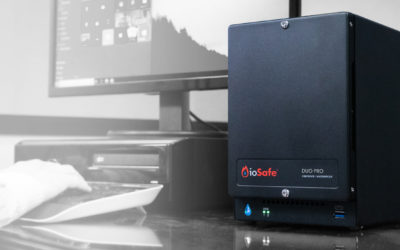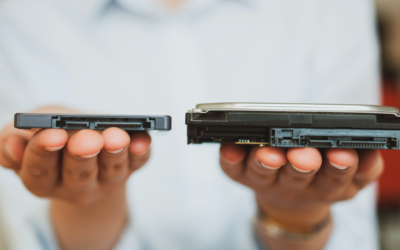Protecting Data as a Digital Nomad (Part 1)
Photo: Annie Wynn
In this three-part series, we’re taking a look at why backups matter, especially for digital nomads, and how to create and execute a backup strategy that fully protects your digital life.
In the wake of the ongoing COVID-19 pandemic, one thing has become clear for those of us who used to work in offices all day every day: we no longer need a dedicated physical building to do our jobs. Yes, we all used to be sitting at desks in cube farms or open space offices from 8-5, Monday through Friday. Now? Many of us have become digital nomads, traveling for a month or two in RVs or jumping to full-time vagabonds as we work from anywhere we can locate a solid cell signal. Some of us have retreated to country cabins or second homes, far from the always-on cable subscriptions we’ve been used to for so many years.
 Most digital nomads who work full-time jobs have serious tech closets in their RVs. Whether you’re living the #vanlife or enjoying a tricked-out Class A motorhome with four televisions, you’ve made sure you have all the tools you need to stay connected and protect your digital assets. Or do you?
Most digital nomads who work full-time jobs have serious tech closets in their RVs. Whether you’re living the #vanlife or enjoying a tricked-out Class A motorhome with four televisions, you’ve made sure you have all the tools you need to stay connected and protect your digital assets. Or do you?
Let’s take a quick look inside a typical tech closet. Most digital nomads subscribe to at least two cell providers (Verizon and ATT are the most popular by far). While a lot of digital nomads get by with dedicated hotspot devices, serious digital nomads use a combination of routers and SIM cards to seamlessly switch providers and aggregate signal bands that produce the best possible signal.
However, as any die-hard road warrior will admit it, sometimes there’s just no signal to be had. A cell tower goes offline, or a network gets overloaded can throw you offline without any notice at all. And that’s when you realize that using the cloud is great for document creation and storage, but only when you’re connected to it. What happens when you can’t get to the cloud, either to back up your files or to finish up that big project due Monday?
Another glance into the typical tech closet might show a Time Machine backup for a Mac or an external hard drive setup for PC or Linux storage and backups. But are your files, your hard work really protected? How you back up your data and how often you back it up needs to be a key part of your tech strategy as a digital nomad.
Those files, by the way, aren’t just work documents or invoices to clients. Your computers also store a lifetime of memories. All those great photos from your travels that you swore you were going to upload to a photo site. Personal documents that would be irreplaceable if they were lost: tax returns and legal papers for example. And let’s not forget the music you listen to while you work and play, and the movies that keep you entertained on cold, rainy nights.
So, let’s have a crash course (sorry, bad pun there…) on why backups matter.
- Backups ensure your files are safe. A dropped laptop or a spilled coffee can happen to the best of us. Accidents shouldn’t mean you lose everything you’ve stored on your computer.
- Malware, viruses, and phishing: the big three trying to get at your data and ruin your day, not to mention all your files. One click on the wrong email or a surprise on that “safe” website can ruin your day, not to mention your files.
- Accidentally trashing a critical file has happened to all of us at one time or another. I still remember hearing the howl of pain from a coworker who just overrode their own safety checks and deleted an entire database. They spent days rebuilding it.
- Theft can happen to anyone, anywhere. Leaving your laptop charging on the table at Starbucks while you run up to get your order seemed like a good idea until you turned around and saw an empty spot where the center of your digital universe used to be.
- Disasters, whether flood or fire or hurricane, can destroy everything in minutes. You can run but can you carry your computer, your backup disk, and your pets?
The reality is you don’t have to be at the mercy of spilled coffee, hackers, or natural disasters. You can protect yourself and your valuable files with a full-coverage backup strategy. And that’s exactly what we’ll be exploring in part two of this series.
Annie Wynn
Guest Blogger
Annie Wynn, our guest blogger for this series, has been a digital nomad for over five years, traveling the US and Canada in her Alto trailer. You can follow her adventures at www.wynnworlds.com.
Related Blog Posts
Introducing the ioSafe Duo Pro
Today we're excited to announce the ioSafe Duo Pro. The Duo Pro is our most reliable direct-attach storage (DAS) fireproof...
HDD or SSD: Which is Better for Backup?
Without a doubt, the two storage technologies that dominate the market today are hard disk drives (HDDs) and solid-state...
How Often Should You Back Up Your Data?
Working for a company with “Data Security” in the name, I spend a lot of my day thinking about backups and data. What...



